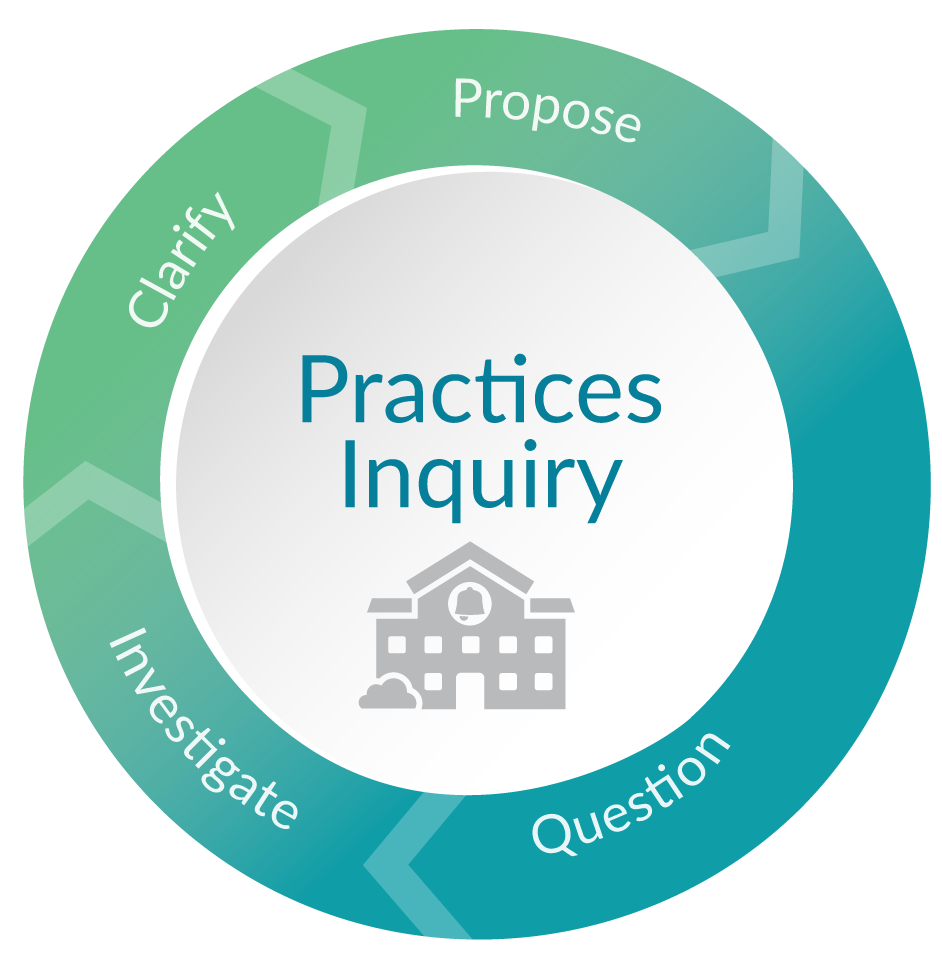
The foundational work in Part 1: Needs Assessment sets the stage for the deep work of inquiry into educator practices. Part 2 is a continuation of the Root Cause Analysis Process, including the work of researching evidence-based improvement strategies. Evidence-based practices are analyzed to determine need, fit, evidence, capacity, usability and support.Practices Inquiry Includes Four Steps:
1. Question: Teams pose inquiry questions about the likely root cause to shape investigation into evidence-based strategies research and actual practice in their school. Questions are posed for both instructional practices and leadership practices related to the highest likely root cause.
2. Investigate: Teams design a plan to investigate qualitative data about practices. Teams may develop and locate evidence sources for instructional and leadership practices that have not been examined before including classroom walk-throughs, educator surveys, interviews and artifacts all relevant to the root cause in practices. Data are collected and organized for analysis and clarification.
3. Clarify: After practice data has been investigated and captured, teams discuss data findings, clarify the data and determine priority outcomes for further action. It is critical that this process be deemed as non-evaluative, but informing in terms of the evidence-based strategies for improvement.
4. Propose: Based on the priority outcomes for practices, teams propose objectives to implement the evidence-based improvement strategy that will achieve the long-term goal for student success.
Practices Inquiry Learning Module
The Practices Inquiry Learning Module 2 is based on foundations of inquiry described in Student Data Inquiry Module 1 . This module provides interactive training and guidance focused on furthering needs assessment by conducting inquiry into educator practices as likely root causes
for student outcomes.
Tools
- Current State Visualization: Helicopter Ride Activity - Guides leadership teams into visualizing policies, procedures and practices that are currently occurring within an organization to set the stage for preparing hypotheses of practice
- Data Inquiry Planning Guide - Guide designed to assist educators and coaches as they plan data inquiry.
- Effective Instruction Self-Assessment - Self-assessment designed to reflect upon and rate the 5 elements of practice and beliefs well as guide and refine instructional practices
- Evaluation (Hexagon) Tool Activity - Guides teams in evaluating and evidenced-based improvement strategies (EBIS) prior to implementation
- Family Engagement Self-Assessment - Guides leadership teams into self-assessing their support and practices for fostering family engagement
- Guide: Clarity of Intended Outcomes - Guides leadership teams into reflecting about and determining the clarity of intended outcomes in their school
- Root Cause Process Brief -
- Self-Assessment of Instructional Leadership - Guides leadership teams into self-assessing their instructional leadership
- Safe & Supported Students Practices Self-Assessment - Guides leadership teams into self-assessing their support and practices for students feeling safe and supported
- Study Guide and Team Self-Reflection: EMLSS Defining Elements - Guides leadership teams into self-assessing their instructional leadership
- Systems Review & Hypotheses: CCR IEP Framework - Guides teams through reviewing system evidence and posing hypotheses of gaps in system practices for College and Career Ready (CCR) IEPs